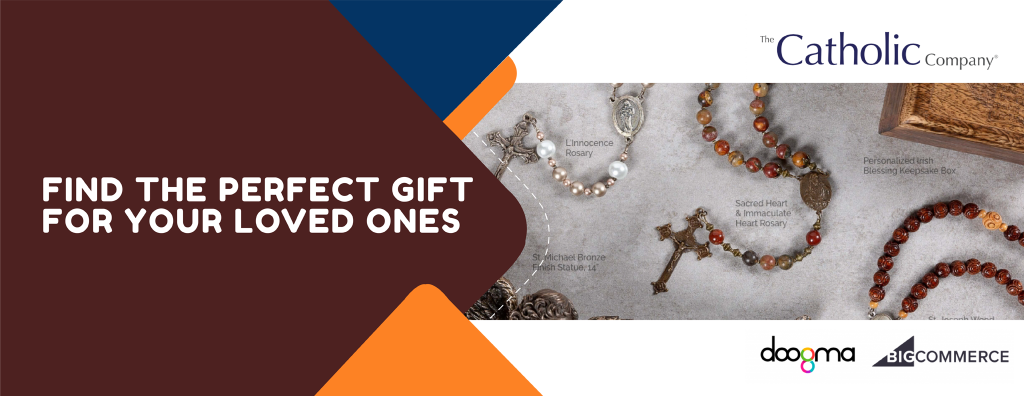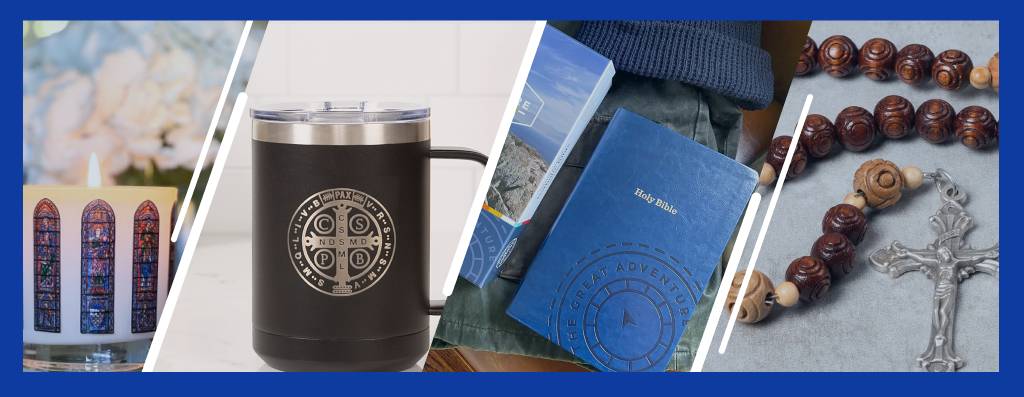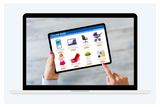
Critical metrics:
- 10s of 1000s of SKUs across 7 websites
- 30% of goods sold are customized
- Greater efficiency with a better customer experience
All About Trinity Road
From its very first door-to-door sale in Charlotte, NC, in early 1997, Trinity Road has applied next-wave technology to fulfilling family-friendly religious and inspirational needs. The tradition of family bibles inscribed with names, dates, and wisdom stretches back to the very first book ever published: Gutenberg’s Bible in 1454.
Now in 2022, Trinity Road has matured into the Amazon of Christian devotion, comprised of several branded sites that sell books, gifts, religious articles, and original expressions of faith for the faithful all over the Earth. They offer more than personalized religious items. They offer comfort, inspiration, joy, and hope.
But success has come with deeper obligations. As their customer base bloomed, it became harder and harder to give each person exactly what they needed most.
Challenge: Bringing Customization and Website Management into the 21st Century
James Hetzel, CEO of Trinity Road, saw a clear vision of the future when the web became widely available in the last days of the 20th century. He was determined to bet his early company on a promising technology called “The Internet,” which was still so new that people spelled it with a capital “I”.
He set up a small site using HTML so that instead of going door to door, families could order their bibles online. On day one, there was just a single order, but the word began to spread. The next week it grew to 30 orders, then 100, then many, many more. Within months, James knew Trinity Road was on the path of righteousness.
Fast forward to the early years of the 21st century. Trinity Road was fulfilling personalized orders using the latest technology in book personalization: “The One Armed Bandit,” in the words of Jessica Pankus, Vice President Of Product Development at Trinity Road.
“The One Armed Bandit was the old school way of foiling a book,” Jessica laughed. “It was this contraption that sat there with little tiles for letters and you would arrange them for each name. Then you had to pull the arm down and it pressed the foiled name into the Bible. That was our first form of personalization for the company.” Foil stamping had been around since the 1800s in one form or another and really wasn’t far from the original Gutenberg’s press design.
Eventually, the time, effort, and cost this required did not add up to a sustainable practice. The same was true of various methods for engraving for rosaries, silver, and other items that were growing in popularity with new customers.
Jessica explained, “I think we have 17 different modes of personalization. We do lasering for leather, wood, and some metals. We can sandblast glass and ceramics. We have a sublimation machine, which literally melts a picture into a mug so it’s permanently on there. We have an embroidery machine, we do our own framed prints. Last year, we bought our most expensive machine: the Rev 360. It takes a cylindrical item like a candle and does a full print with no seam. One of the sites we’re launching this summer (that also uses the Doogma Designer™) will be a very large candle business.”
The hardest part was finding an easy way for customers to provide the names, wishes, and personal messages destined for these unique customization channels. Then those customer files had to be translated by technicians into the kind of files that would work with the customization method. There were plenty of points where errors could enter the process.
Finally, people wanted to see how it all would look and then make adjustments before they paid for the customized items. Mockups weren’t easy and often not accurate enough.
While the company handled these challenges, its rapid growth and aging technology made it tough to manage fluctuating inventory, maintain precise accounting and keep the web page current. Trinity Road turned to BigCommerce to provide the kind of turnkey web platform that all of Trinity Road’s many websites really needed.
And that was the path that led directly to Doogma.

Solution: BigCommerce and Doogma Go Hand in Hand
When the pandemic hit in 2020, there was a surge in customers looking for online, customized religious items. Trinity Road sought out new technology to help scale up as rapidly as demand.
“We made the decision a couple of years ago to go to a completely SaaS platform, 100% across the board,” Jessica said. “Migrating onto BigCommerce took us about a year to fully switch over. Through BigCommerce we got into other platforms. NetSuite is now our back-end ERP for clear visibility into our data and tighter control over our business.”
Along the way, Trinity Road found plenty of components on BigCommerce that could improve their sites with plug-and-play simplicity. They added a widget for shipping and another for gift cards. Then BigCommerce came to them with a game-changer.
Jessica continued, “BigCommerce told me, ‘Hey, there’s a site called Doogma, and they’re pretty cool. They do all kinds of personalization and one of the best features is on-site visualization so your customers can see exactly what they are getting. That will raise satisfaction and conversions and all of that.”
Jessica ran the numbers to find that even a slight increase in conversions would pay for the upgrade to all of their sites. Additionally, she knew that when people see their own name and messages on an item they want, that works wonders for full customer experience.
Results: Better Customer Experience and More Efficient Personalization Processes
Doogma’s Customization engine does double duty – making the sales experience smoother for customers and making the customization experience more efficient for the company.

Jessica laid out how each side benefits: “On the customer side, Doogma presents a great visual representation of what you’re going to have at the end of it all. It really helps make it real for them. On the technician side, Doogma has cut down on our labor significantly because now they’re getting exactly what they need in a complete file, no editing needed. Technicians just take that file and they put it through.”
She was also delighted with the way Doogma adapted to solve any problems during installation and create software solutions on the fly. “At one point, we asked them if they could take on a little extra work. They said ‘Yes, absolutely.’ They were willing to do whatever it took to help us get our program up and running. Dan and Lena have been great.”
“It’s been awesome,” Jessica summed up. “We’re excited to introduce Doogma customization engines into the rest of our branded sites as we continue to grow.”
Takeaways:
1 BigCommerce makes it easy for all kinds of online businesses to operate more efficiently and integrate ready-made components that have proven essential for eCommerce success.
2. Not only does an in-page product personalization experience provide an improved user experience and better conversions, but companies can also recognize considerable savings by streamlining the production process. That means less chance of human error during keying in data, replacing this with automated print/engraving files.
3 Doogma demonstrates why intelligent customization is the future of eCommerce. When customers take part in creating what they want, they have a stronger emotional connection to what they buy and the brand that provides it.
4 Customer experience is the defining advantage in a world where your competitors are just a click away. A fun, exciting customer experience is the first step to larger shopping carts, higher conversions, and satisfied, engaged customers.




